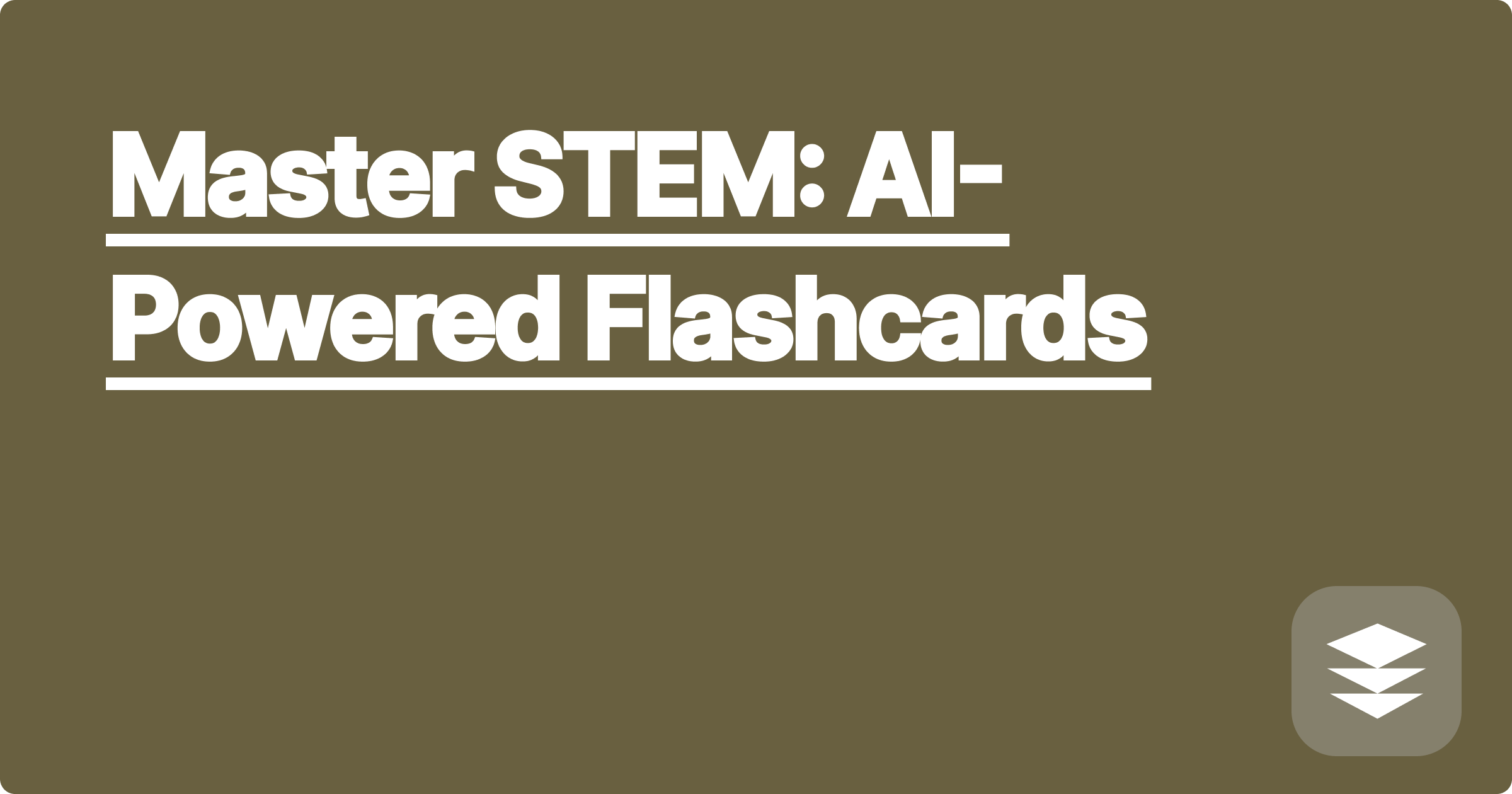
STEM fields present a unique challenge: mastering vast amounts of complex information, from intricate formulas to abstract concepts. Traditional study methods often fall short, leaving students struggling to retain and apply this knowledge effectively. Artificial intelligence offers a powerful new approach to learning, providing personalized and adaptive tools that can significantly enhance the learning process. AI-powered flashcards represent one such innovation, transforming how STEM students interact with and internalize critical information. These intelligent flashcards go beyond simple rote memorization, fostering deeper understanding and facilitating the application of learned concepts.
This shift towards AI-augmented learning is particularly crucial for STEM students and researchers facing increasingly demanding curricula and competitive research landscapes. The ability to quickly and efficiently absorb complex material is no longer a luxury but a necessity. AI-powered flashcards offer a competitive edge, enabling students to optimize their study time, improve retention, and ultimately achieve greater academic success. They also empower researchers to stay abreast of rapidly evolving fields, providing a dynamic tool for continuous learning and knowledge synthesis.
Traditional flashcards, while helpful for basic memorization, often fail to capture the interconnectedness and nuanced nature of STEM concepts. They tend to promote isolated learning, making it difficult to grasp the broader context and apply knowledge to novel problems. Furthermore, creating and managing large decks of flashcards can be time-consuming and tedious, detracting from valuable study time. The sheer volume of information in STEM subjects can feel overwhelming, leading to inefficient study habits and ultimately hindering deep understanding. This problem is further compounded by the fact that STEM concepts often build upon one another, requiring a strong foundational understanding to grasp more advanced topics. Without a robust system for organizing and internalizing information, students can quickly fall behind, leading to frustration and decreased motivation.
AI tools like ChatGPT, Claude, and Wolfram Alpha offer a transformative solution to the challenges of STEM learning. These platforms can be leveraged to create dynamic, interconnected flashcards that go beyond simple definitions. ChatGPT and Claude, for example, can generate context-rich explanations, provide real-world examples, and even create practice questions related to specific concepts. Wolfram Alpha excels at handling complex calculations, visualizing formulas, and providing step-by-step solutions to problems. By integrating these AI capabilities, students can create flashcards that are not only informative but also engaging and interactive. This approach fosters a deeper understanding of the material, promoting active recall and facilitating the application of knowledge to diverse scenarios.
Begin by identifying the key concepts you need to learn. Then, use an AI tool like ChatGPT or Claude to generate concise definitions and explanations for each concept. Next, enrich these flashcards with relevant examples, diagrams, or even code snippets. For mathematical or scientific formulas, leverage Wolfram Alpha to generate visualizations and explore different applications. Importantly, don't just passively consume the information provided by the AI. Actively engage with the material by asking clarifying questions, exploring related concepts, and testing your understanding through practice problems. Organize your AI-generated flashcards into thematic decks, creating connections between related concepts. Regularly review and update your flashcards, incorporating new information and insights as you progress through your studies.
Consider the concept of derivatives in calculus. A traditional flashcard might simply state the definition of a derivative. An AI-powered flashcard, however, could provide a concise definition generated by ChatGPT, accompanied by a visual representation of the derivative as the slope of a tangent line generated by Wolfram Alpha. Furthermore, it could include real-world examples of derivatives in physics, such as velocity and acceleration, provided by Claude. Another example is learning chemical reactions. AI can generate balanced chemical equations, predict reaction products, and even provide 3D visualizations of molecular structures. For coding concepts, AI can generate code snippets, explain syntax, and provide examples of how specific functions are used in different programming languages.
To maximize the effectiveness of AI-powered flashcards, focus on creating interconnected decks that reflect the relationships between different concepts. Don't simply memorize isolated facts; strive to understand the underlying principles and how they connect to the bigger picture. Regularly review your flashcards using spaced repetition techniques to optimize retention. Actively engage with the material by asking questions, seeking clarification, and applying your knowledge to practice problems. Experiment with different AI tools to find the ones that best suit your learning style and the specific subject matter. Remember that AI is a tool to enhance your learning, not replace it. Your active participation and critical thinking remain essential for deep understanding and academic success.
In conclusion, AI-powered flashcards represent a powerful new approach to STEM learning, offering a dynamic and personalized way to master complex information. By leveraging the capabilities of AI tools like ChatGPT, Claude, and Wolfram Alpha, students can create interconnected flashcards that promote deep understanding and facilitate the application of knowledge. Embrace this innovative technology, experiment with different strategies, and discover how AI can empower you to achieve your academic goals and unlock your full potential in STEM. Start by identifying a challenging topic in your current coursework and explore how AI can help you create more effective learning materials. The future of STEM learning is here, and it's powered by AI.
Ace STEM Exams: AI Study Planner
AI for Lab: Data Analysis Made Easy
Master STEM: AI-Powered Flashcards
Coding Help: AI Debugging Assistant
AI in Engineering: Simulation Power
Exam Prep: AI Practice Questions
Math Solver AI: Get Unstuck Now!